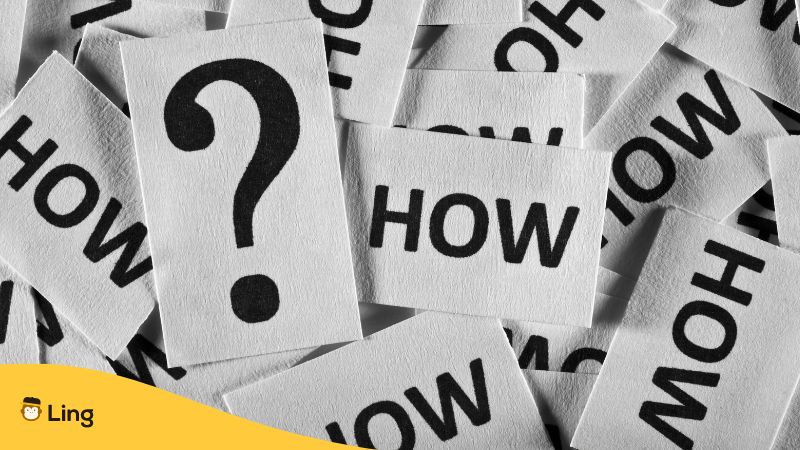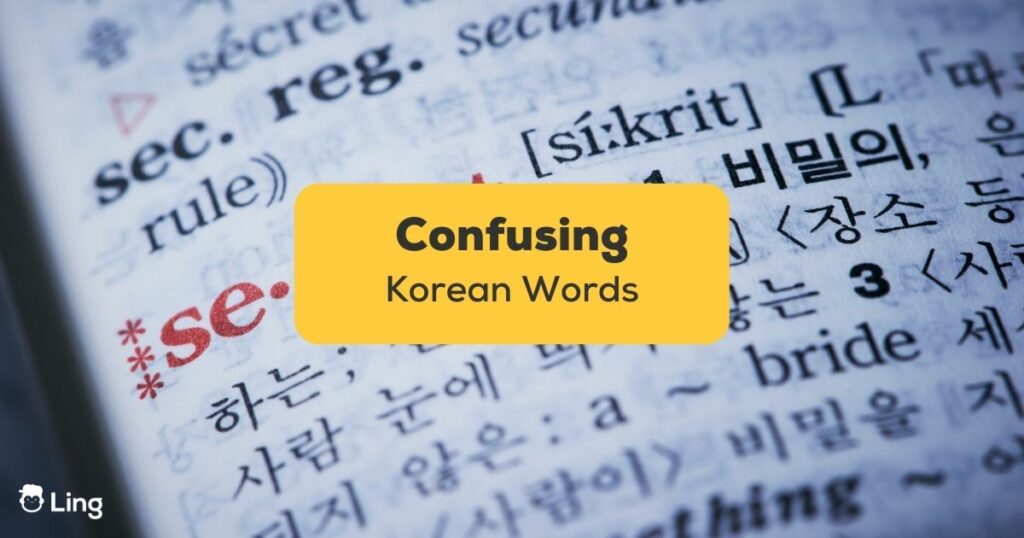The funny thing about language learning is the similarities of words that have totally different meanings. Even Korean words have these mind-boggling words that’ll make imaginary question marks above your head once you hear them. Read further to learn more about these confusing Korean words today!
Discovering a new language can be an exciting journey, but it often comes with several hurdles. One common challenge that language learners face is dealing with confusing words, and Korean is no exception. Korean, a rich and complex language, has several words that sound similar or have similar meanings, making it easy to get confused. In this post, we will unveil some commonly confused words in Korean and provide insights on how to differentiate them.
Before we head onto the main topic, remember that looking at the context is the key to understanding the differences between these words. So, are you ready? Let’s spot the difference and similarities between these confusing Korean words!
What Are The 6 Most Confusing Korean Words You Should Remember?
If you’re desperate to learn Korean, you must be prepared to encounter these confusing Korean words. Even native speakers find some of them baffling too! So, grab your pen and paper as we’re about to set out on a confusing dive into Korean words.

1. 어떻해 (Eotteokhae) vs. 어떻게 (Eotteoke)
어떻해 (Eotteokhae) is commonly used in informal speech. It can be translated as “What should I/we do?” or “How can I/we handle it?” This expression is often used when seeking advice, guidance, or suggestions from someone regarding a problem or situation.
While 어떻게 (Eotteoke) is more versatile and commonly used in various contexts. It can be translated as “how” or “in what way.” It is used to ask for information or details about the manner or method of doing something. It is generally used in both formal and informal situations.
Here are some examples that can help you understand their difference better:
- 어떻해? 알바를 하면 어때? (Eotteokhae? Albareul hamyeon eoddae?): What should you do? How about getting a part-time job?
- It doesn’t really ask “how” to do things but rather helps the Korean speaker express their frustrations as they think of solutions.
- 이 문제를 어떻게 풀어야 할까요?” (I munjeleul eotteoke pureoya halkkayo?): How should I solve this problem?
- Its English equivalent is “how?” which it’s simply used to directly ask a question that has a direct answer.
2. 늘이다 (Neul-i-da) vs. 늘리다 (Neul-li-da)
Most Korean verbs can be confusing for beginners, just as 늘이다 and 늘리다 are. Both refer to action words, but 늘이다 (Neulida) has the literal translation “to stretch or extend” while 늘리다 (Neullida) translates to the English word “increase/raise.” Below are some Korean phrases you can check to prevent committing common mistakes when speaking the language:
- 체조 선수는 몸을 늘이고 있었다. (Chejo seonsuneun momeul neurigo isseotda.): The gymnast was stretching his body.
- 회사는 생산량을 늘리기 위해 노력하고 있다. (Hoesaneun saengsanryang-eul neulligi wihae noryeokhago itda): The company is making efforts to increase production volume.
3. 붙이다 (But-i-da) vs. 부치다 (Bu-chi-da)
If you don’t know how to read Korean, you’ll probably get confused with this Korean word. 붙이다 (Butida) refers to sticking something. In direct translations, it means “to stick to.” While 부치다 (Buchida) translates to “to send.” So, upon hearing these words, you may need to analyze the message first not to get confused.
Here are some phrases that can help you distinguish their difference:
- 저는 우표를 편지에 붙였어요 (Jeoneun upyo-reul pyeonji-e buteosseoyo.): I stuck a stamp on the letter.
- You may see in this sentence, buteosseoyeo (붙이다/Butida) pertains to the action of attaching something.
- 저는 편지를 우편함에 부쳤어요 (Jeoneun pyeonji-reul upyeonham-e buchyeosseoyo.): I mailed the letter in the mailbox.
- The word that was put in bold text translates to the phrase “I sent it.” As mentioned before the correct use of 부치다 (Bu-chi-da) in Korean phrases is to send something.
4. 맞추다 (Mat-chu-da) vs. 맞히다 (Mat-chi-da)
At first glance, it may seem like a word that won’t really cause a lot of confusion for English speakers. Considering the pronunciation “chu” and “chi” sounds pretty easy to spot, don’t you think? However, this is the part where it gets tricky. If you listen to its pronunciation in the Korean language, they both sound like “Matchuda.” So, what’s the difference?
- 맞추다 (Mat-chu-da) refers to the action of setting or adjusting something. Here’s an example to help you understand its use better:
- 저는 친구와 퍼즐을 맞추고 있습니다 (Jeoneun chinguwa peojeul-eul majchugo issseubnida): I am matching puzzles with my friend.
- 맞히다 (Mat-chi-da) translates to “guess something correctly.”
- 저는 어려운문제를 맞혀냈습니다 (Jeoneun eolyeoun munjeleul majhyeonaessseubnida): I successfully guessed the difficult problem.

5.가다 (Gada) vs. 오다 (Oda)
가다 (Gada) is used when someone is going away from the speaker, while 오다 (Oda) is used if the person is coming toward the speaker. The idea can be a little baffling at first, but once you understand these phrases, you’ll get the hang of it!
- 나는 학교에 가요. (Naneun hakgyo-e gayo): I am going to school.
- Once you use this word in a sentence it becomes “gayo.” 가다 (Gada) simply translates to “to go” in English.
- 친구가 집에 오고 있어요. (Chingu-ga jibe ogo isseoyo): My friend is coming to my house.
- When you translate 오다 (Oda) in English, you get “to come.”

6. 사과 (Sagwa) vs. 사과 (Sagwa)
In Korean, the word 사과 can have two different meanings depending on the context. It can either mean “apology” or “apple.” The pronunciation and spelling are the same, so it’s important to pay attention to the context to understand the intended meaning. It would be weird to hear “Apple” whenever you try to apologize, don’t you think?
- 저는 사과를 좋아해요. (Jeoneun sagwareul johahaeyo): I like apples.
- “죄송합니다. 제가 실수를 해서 사과드립니다. (Joesonghamnida. Jega silsuleul haeseo sagwadeurimnida): I’m sorry. I apologize for my mistake.
Want To Take Korean Lessons Today? Try Ling Now!
Native Koreans must have a knack for good hearing, don’t you think? Their verbs, adjectives, and even the simplest nouns can complicate the language-learning process. But did you know that you can learn to write and even attain fluency in learning this language?
With the Ling app, learning languages are made easy as you practice for 15 minutes every day. You can also enhance your vocabulary with the exercises and quizzes available on the app. Get Ling today for FREE on Play Store and App Store!































































